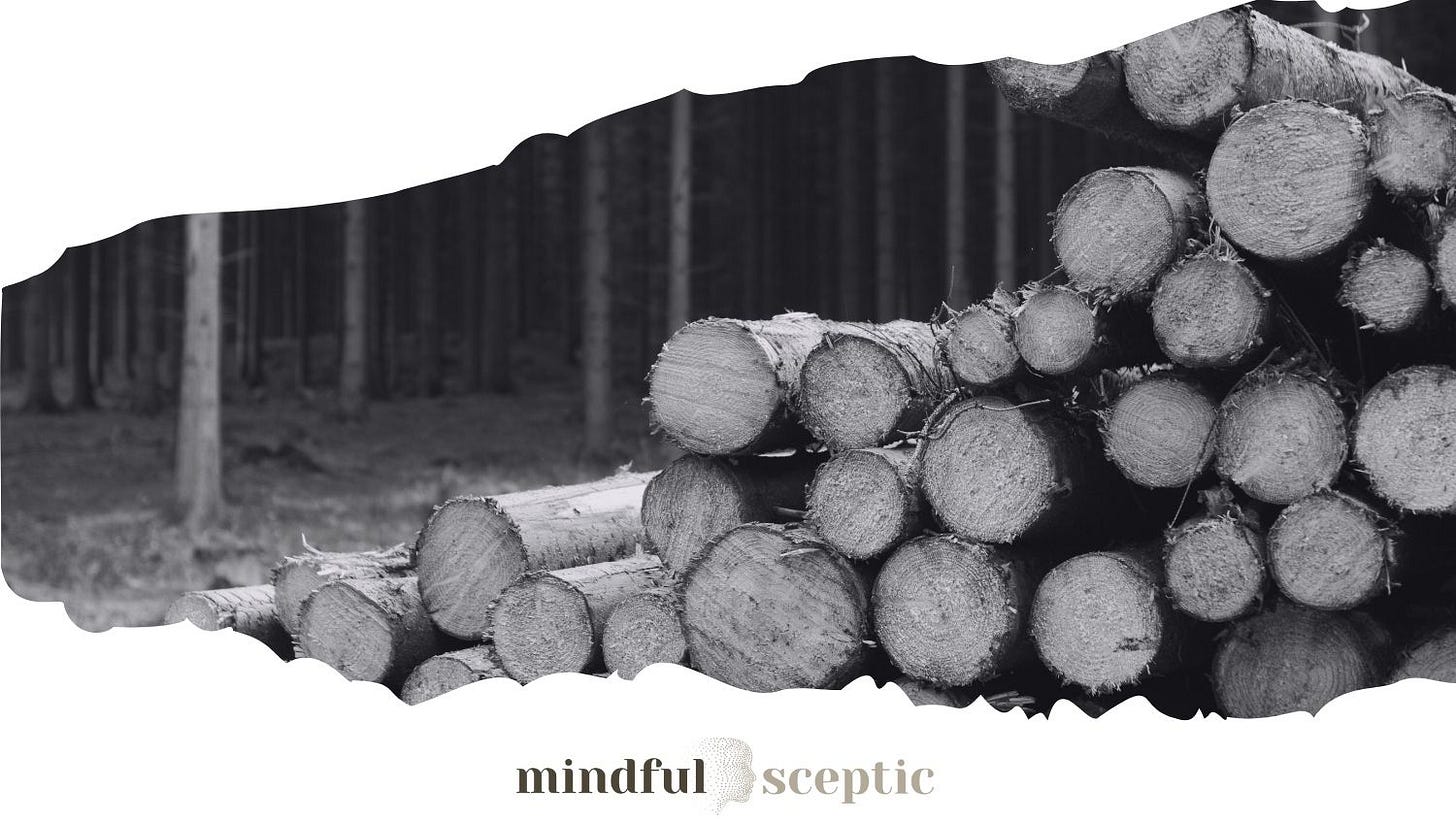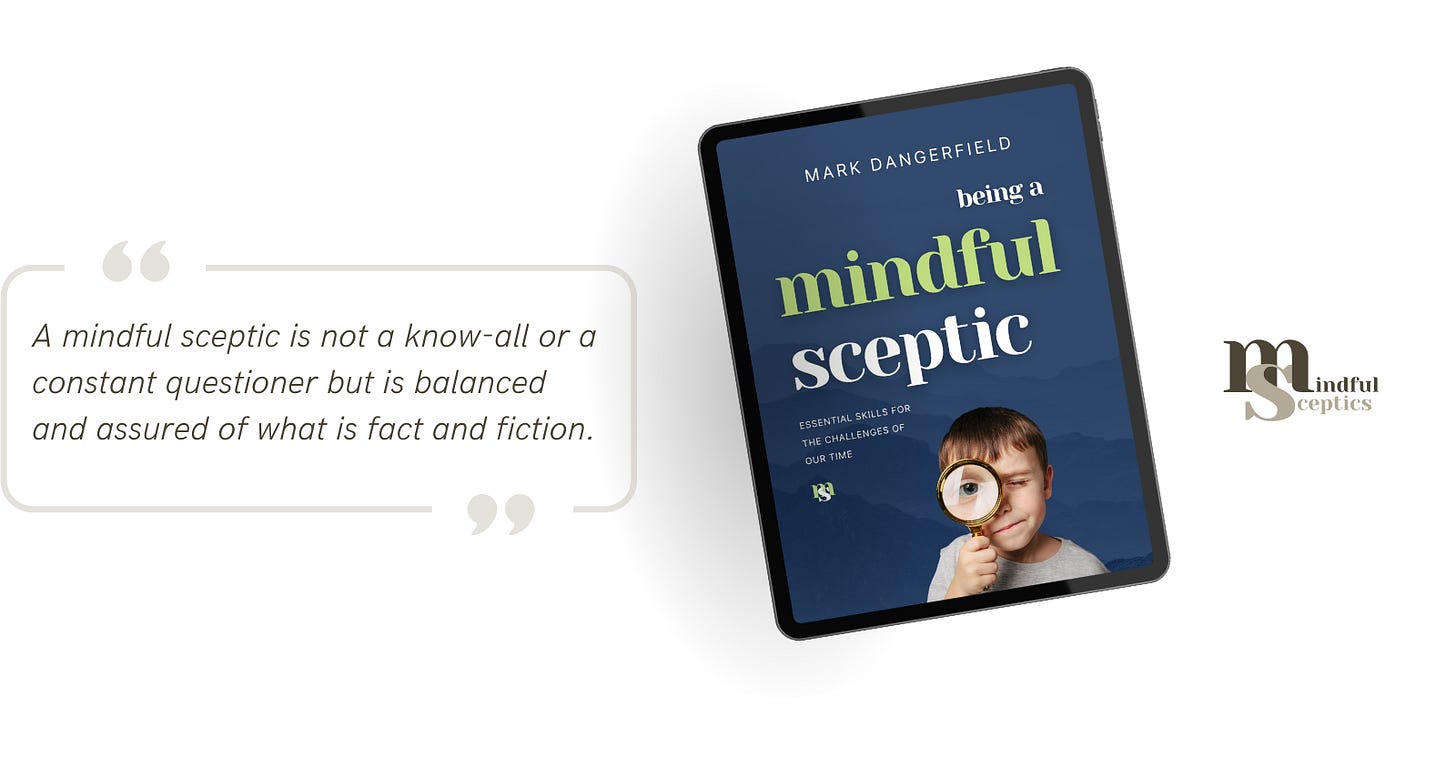Questions That Matter
Five deceptively simple inquiries reveal the true complexity of our environmental predicament
Right now, someone is clearing rainforest in Brazil, another is installing solar panels in Germany, and a third is drilling for oil in Texas.
And they are not alone in their endeavours.
Each action has consequences, yet we spend more time arguing about who's to blame than finding real solutions to keeping 8 billion people alive and well, assuming that is what most of us want once our needs are met.
The reality is that humans are living through and have created an unprecedented environmental experiment. And some of the results are alarming.
But rather than add to the chorus of criticism, let me share something more constructive.
Here are five questions a curious sceptic would ask that might help us think more clearly about our environmental challenges.
Can capitalism in its various flavours keep humanity from calamitous collapse over the next 100 years?
Answer… no, but…
Capitalism has driven innovation, economic growth, and the development of modern infrastructure. A billion people, mainly in the global north, have benefitted dramatically through significant improvements in living standards. A few billion more have benefitted from the trickle effect and had their expectations raised.
Capitalist systems, particularly those with democratic governance and strong regulatory frameworks, have the potential to adapt to global challenges such as climate change, inequality, and resource depletion. In its more socially responsible forms, like social democracy, capitalism can incorporate welfare systems, environmental regulations, and corporate accountability to help safeguard public interests.
However, it’s not so crash-hot on humanity's global challenges. Environmental degradation, overconsumption of finite resources, extreme inequality (the 1,000 wealthiest individuals control between 5-7% of global wealth) and climate change are exacerbated by the profit-driven motives of unchecked capitalism that tend to prioritize short-term gains and externalize costs like pollution and social welfare.
Currently, capitalism is a disincentive to long-term sustainability or prioritising ecological and social welfare over profit.
For capitalism to help humanity avoid collapse, it would have to reimagine growth models, embedding circular economies, reduce inequality, and enforce global cooperation.
All seem unlikely.
A doctor doesn't waste time blaming a patient's lifestyle choices during a heart attack. They focus on immediate survival and then long-term viability.
Our environmental challenges need similar pragmatism.
Here is another environmental challenge question…
How do we get sufficient nutrients into 8 billion people's bodies for a hundred years in a secure way that puts a lid on fear responses and stops people from fighting each other?
Answer… not without changes to the current system, starting with recognising the challenge.
This question cuts through the noise around food security by focusing on practical needs. It's not about organic versus conventional, local versus global, or any other false dichotomy. It's about the fundamental challenge of feeding everyone well.
And the numbers are stark. We need about 22 trillion kilocalories daily to feed everyone, increasing by roughly 200 billion calories each day as the population grows.
Conventional wisdom is that we need to build a sustainable food system that can support the growing global population while respecting the planet's ecological limits. This requires investment in resilient agricultural practices, such as regenerative farming, precision agriculture, and biotechnology to increase yields, enhance nutritional value, and reduce environmental impacts like soil degradation and water scarcity.
In parallel, innovations in food production, such as lab-grown meats, algae, and plant-based alternatives, must be explored to diversify the sources of essential nutrients while minimizing the carbon footprint.
At the production end, we need to pull out all the stops. Retain the good options, phase out the poor ones and accept the magnitude of the challenge.
Once the food exists, equitable distribution systems are critical.
Addressing global food inequalities, where some regions face overnutrition while others are plagued by hunger, involves stronger international cooperation and policy frameworks. Strengthening local food systems, reducing food waste (accounting for nearly 30% of global production), and improving access to nutrient-rich foods for all communities is essential to building a more secure food chain.
Fail at this, and there will be conflict—lots of it.
Social and psychological frameworks are also necessary to mitigate fear responses related to food scarcity, which often drive conflict. Ensuring transparent communication about food availability, fostering community-based solutions, and promoting cooperation rather than competition over resources can help manage anxiety and fear.
Implementing education programs focusing on food security, community resilience, and environmental stewardship can create a more informed public, reducing reactionary behaviours and fostering long-term collaboration.
If this all sounds hard, near impossible even, then that's because it is.
Food systems that feed half the world operate under a capitalist model. Food for the other half comes from increasingly precarious subsistence systems.
Both will have to change and adapt.
What happens when we separate consequences from fault in our analysis of environmental challenges?
Answer… potentially, a whole lot.
A consequence follows from any action regardless of fault.
If someone misses an important meeting because they overslept, that's a consequence. Whether they overslept due to insomnia, a faulty alarm, or staying up late watching Netflix might assign fault, but doesn't change the consequence.
Similarly, environmental degradation is a consequence of human activity, but getting stuck on fault often prevents us from finding solutions.
When we separate consequences from fault, the focus shifts from determining who is responsible to mitigating the impacts and finding practical solutions. This means we can tackle the environmental damage itself, such as ecosystem degradation or climate change effects, rather than argue on the socials over accountability.
Separation should also allow a more collaborative and less adversarial approach to problem-solving, as it moves beyond assigning blame to any one group, nation, or industry and toward a collective effort to repair or prevent further harm.
In turn, collaboration should create space for more forward-thinking strategies rather than being bogged down by historical grievances. For example, when focusing on the effects of climate change—like rising sea levels or biodiversity loss—it becomes more productive to allocate resources to adaptation and resilience-building rather than only investing time in identifying which actors contributed most to the issue.
Imagine suggesting this at a COP!
But there are risks too. Without recognition of historical or ongoing responsibility, there may be inadequate pressure on key actors to change behaviours or make reparative contributions.
Even the relatively innocuous questions are gnarly.
What objective evidence would we need to properly evaluate proposed environmental solutions like regenerative agriculture, rewilding, and green deals?
Answer… multiple lines of enquiry to generate evidence that can be woven into a holistic view.
We will need the science metrics around biodiversity assessment, soil health, energy use, externalities and the like, just like we need them for intensive resource use. Preferably, it will be gathered from well-designed before-after, comparative surveys, and trend assessments.
Only, too often, we embrace solutions based on how they make us feel rather than how well they work. A mindful sceptic asks for evidence before jumping on bandwagons.
For instance, regenerative agriculture sounds terrific, but what metrics would prove it can feed 8 billion people? What’s the yield dip and rate of recovery? Is it possible to transfer from intensive production at this location, can the soul still bounce back? We need testable hypotheses, not just appealing narratives.
I am a scientist who has researched this question.
I even founded a monitoring company that used biodiversity as an index of environmental management. So, I am bound to say that the evaluation of environmental solutions needs empirical evidence across multiple domains. Also, such evidence is well within our capability.
In addition to ecological factors, economic viability is essential at least before we change to some alternative social contract.
We probably still need detailed cost-benefit analyses that assess the long-term economic sustainability of these approaches compared to conventional methods. This includes evaluating potential savings from ecosystem services, such as pollination or flood mitigation, alongside the initial investment costs.
So-called ‘green deals’, in particular, would require evidence showing whether economic growth can be decoupled from environmental harm and whether renewable energy, job creation, and infrastructure investments yield returns that justify their implementation.
And we can not forget the people. Social impacts on local communities, food security, livelihoods, and health are just as significant.
Public acceptance and behavioural changes are critical for long-term success, so understanding how policies and programs influence human actions, and well-being is key.
We have the tools. Surveys, case studies, and social science research can provide insight, especially if they are combined with ecological, economic, and social data into integrated models that would offer a holistic view of the effectiveness and scalability of these environmental solutions.
But a warning from experience.
This logic is sound, but implementation is another matter entirely.
How can we maintain scientific objectivity while acknowledging that human values inevitably influence environmental decisions?
This might be the most crucial question of all.
Pretending we can eliminate values from environmental decisions is naive, but letting values override evidence is dangerous. We need a balanced approach that respects both.
Scientific objectivity is the pursuit of unbiased, evidence-based understanding that is foundational for making informed decisions about environmental issues. However, human values—such as cultural beliefs, economic priorities, and ethical considerations—inevitably influence the perception and interpretation of environmental data.
While pure objectivity aims to remove personal bias, it is important to acknowledge that scientific inquiries, especially in environmental science, often arise from value-laden contexts. This dual influence necessitates careful distinction between empirical facts and the subjective values that guide the framing of environmental questions.
Everyone has to be careful… and honest.
Transparent methodologies and peer review will help. Scientists can outline their assumptions, limitations, and the specific context of their research to provide clarity on where value judgments might influence outcomes.
Then everyone needs to recognise and respect the honesty.
For example, while climate models can objectively measure emissions and predict impacts, decisions about acceptable risk or mitigation strategies often reflect societal values about economic growth or intergenerational equity.
Ultimately, scientific objectivity does not require the exclusion of human values, but instead demands clarity about how these values intersect with empirical evidence.
The next time you encounter an environmental claim, try asking
What's the evidence? (Not opinions or theories, but actual data)
Who benefits? (Follow both the money and the narrative)
What's being assumed? (Look for unstated premises)
You might be surprised how many "facts" rest on shaky foundations.
The Mindful Sceptic newsletter explores these themes weekly, offering practical frameworks for understanding and addressing our most pressing environmental challenges. Each issue combines rigorous analysis with actionable insights, helping readers move beyond the blame game to find real solutions.
Join us in asking better questions. The answers might surprise you.





